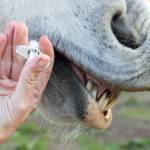Some Equine Products Dangerous for Dogs, Other Animals

Horse enthusiasts are often also dog enthusiasts, and dogs frequently accompany their owners to the barn, to the show grounds, and on trail rides. A number of dog breeds, including many shepherd breeds, have a mutation that makes them extremely sensitive to ivermectin, and mixed-breed dogs may have inherited the mutation from a shepherd-type ancestor.
These dogs may also be poisoned by selamectin, milbemycin, moxidectin, acepromazine, butorphanol, and loperamide (Imodium). To be safe, don’t let dogs eat ivermectin; clean up any spilled or dropped ivermectin products; and carefully dispose of deworming tubes, caps, leftover product, and wrapping materials.
Deworming products are not the only potential trouble-makers in the barn or medicine cabinet. Some cattle feeds contain additives (ionophores, usually for beef cattle diets) that improve rumenal fermentation in cattle but are extremely toxic to horses. Horse feed contains copper that is toxic to sheep, though goats require a certain level of copper in their diet and can tolerate small amounts of horse feed. Calf milk replacer, however, can cause copper toxicity in young goats. Acetaminophen (Tylenol) is toxic to cats, though some other animals can tolerate it. On the other hand, cats that are put on Prozac therapy are given a small dose of the human-grade medication.
To be on the safe side, don’t use human preparations on animals without a veterinarian’s guidance. Avoid mixing medications, feeds, supplements, or other products among or between types of animals without specific permission from a veterinarian.








